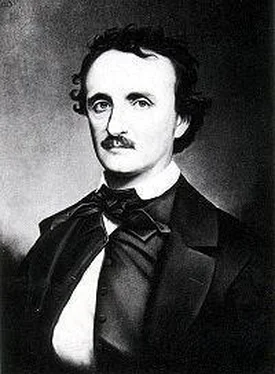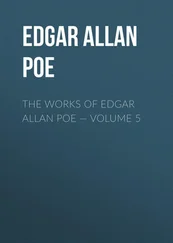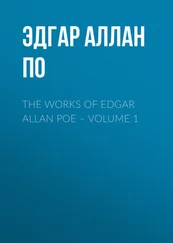Эдгар По - Works of Edgar Allan Poe
Здесь есть возможность читать онлайн «Эдгар По - Works of Edgar Allan Poe» весь текст электронной книги совершенно бесплатно (целиком полную версию без сокращений). В некоторых случаях можно слушать аудио, скачать через торрент в формате fb2 и присутствует краткое содержание. Жанр: Старинная литература, на английском языке. Описание произведения, (предисловие) а так же отзывы посетителей доступны на портале библиотеки ЛибКат.
- Название:Works of Edgar Allan Poe
- Автор:
- Жанр:
- Год:неизвестен
- ISBN:нет данных
- Рейтинг книги:4 / 5. Голосов: 1
-
Избранное:Добавить в избранное
- Отзывы:
-
Ваша оценка:
- 80
- 1
- 2
- 3
- 4
- 5
Works of Edgar Allan Poe: краткое содержание, описание и аннотация
Предлагаем к чтению аннотацию, описание, краткое содержание или предисловие (зависит от того, что написал сам автор книги «Works of Edgar Allan Poe»). Если вы не нашли необходимую информацию о книге — напишите в комментариях, мы постараемся отыскать её.
Works of Edgar Allan Poe — читать онлайн бесплатно полную книгу (весь текст) целиком
Ниже представлен текст книги, разбитый по страницам. Система сохранения места последней прочитанной страницы, позволяет с удобством читать онлайн бесплатно книгу «Works of Edgar Allan Poe», без необходимости каждый раз заново искать на чём Вы остановились. Поставьте закладку, и сможете в любой момент перейти на страницу, на которой закончили чтение.
Интервал:
Закладка:
Go to top
Literary style and themes

1860s portrait by Oscar Halling after an 1849 daguerreotype
Genres
Poe's best known fiction works are Gothic, a genre he followed to appease the public taste. His most recurring themes deal with questions of death, including its physical signs, the effects of decomposition, concerns of premature burial, the reanimation of the dead, and mourning. Many of his works are generally considered part of the dark romanticism genre, a literary reaction to transcendentalism, which Poe strongly disliked. He referred to followers of the movement as "Frogpondians" after the pond on Boston Common. and ridiculed their writings as "metaphor-run", lapsing into "obscurity for obscurity's sake" or "mysticism for mysticism's sake." Poe once wrote in a letter to Thomas Holley Chivers that he did not dislike Transcendentalists, "only the pretenders and sophists among them."
Beyond horror, Poe also wrote satires, humor tales, and hoaxes. For comic effect, he used irony and ludicrous extravagance, often in an attempt to liberate the reader from cultural conformity. In fact, "Metzengerstein", the first story that Poe is known to have published, and his first foray into horror, was originally intended as a burlesque satirizing the popular genre. Poe also reinvented science fiction, responding in his writing to emerging technologies such as hot air balloons in "The Balloon-Hoax".
Poe wrote much of his work using themes specifically catered for mass market tastes. To that end, his fiction often included elements of popular pseudosciences such as phrenology and physiognomy.
Literary theory
Poe's writing reflects his literary theories, which he presented in his criticism and also in essays such as "The Poetic Principle". He disliked didacticism and allegory, though he believed that meaning in literature should be an undercurrent just beneath the surface. Works with obvious meanings, he wrote, cease to be art. He believed that quality work should be brief and focus on a specific single effect. To that end, he believed that the writer should carefully calculate every sentiment and idea. In "The Philosophy of Composition", an essay in which Poe describes his method in writing "The Raven", he claims to have strictly followed this method. It has been questioned, however, if he really followed this system. T. S. Eliot said: "It is difficult for us to read that essay without reflecting that if Poe plotted out his poem with such calculation, he might have taken a little more pains over it: the result hardly does credit to the method." Biographer Joseph Wood Krutch described the essay as "a rather highly ingenious exercise in the art of rationalization".
Go to top
Legacy

Illustration by French impressionist Édouard Manet for the Stéphane Mallarmé translation of The Raven, 1875. Digitally restored.
Literary influence
During his lifetime, Poe was mostly recognized as a literary critic. Fellow critic James Russell Lowell called him "the most discriminating, philosophical, and fearless critic upon imaginative works who has written in America", though he questioned if he occasionally used prussic acid instead of ink. Poe was also known as a writer of fiction and became one of the first American authors of the 19th century to become more popular in Europe than in the United States. Poe is particularly respected in France, in part due to early translations by Charles Baudelaire. Baudelaire's translations became definitive renditions of Poe's work throughout Europe.
Poe's early detective fiction tales starring the fictitious C. Auguste Dupin laid the groundwork for future detectives in literature. Sir Arthur Conan Doyle said, "Each [of Poe's detective stories] is a root from which a whole literature has developed.. Where was the detective story until Poe breathed the breath of life into it?" The Mystery Writers of America have named their awards for excellence in the genre the "Edgars". Poe's work also influenced science fiction, notably Jules Verne, who wrote a sequel to Poe's novel The Narrative of Arthur Gordon Pym of Nantucket called An Antarctic Mystery , also known as The Sphinx of the Ice Fields . Science fiction author H. G. Wells noted, " Pym tells what a very intelligent mind could imagine about the south polar region a century ago."
Like many famous artists, Poe's works have spawned innumerable imitators. One interesting trend among imitators of Poe, however, has been claims by clairvoyants or psychics to be "channeling" poems from Poe's spirit. One of the most notable of these was Lizzie Doten, who in 1863 published Poems from the Inner Life , in which she claimed to have "received" new compositions by Poe's spirit. The compositions were re-workings of famous Poe poems such as "The Bells", but which reflected a new, positive outlook.
Even so, Poe has not received only praise, but some criticism as well. This is partly because of the negative perception of his personal character and its influence upon his reputation. William Butler Yeats was occasionally critical of Poe and once called him "vulgar". Transcendentalist Ralph Waldo Emerson reacted to "The Raven" by saying, "I see nothing in it" and derisively referred to Poe as "the jingle man". Aldous Huxley wrote that Poe's writing "falls into vulgarity" by being "too poetical" - the equivalent of wearing a diamond ring on every finger.
Physics and cosmology
Eureka: A Prose Poem , an essay written in 1848, included a cosmological theory that presaged the big bang theory by 80 years, as well as the first plausible solution to Olbers' paradox. Poe eschewed the scientific method in Eureka and instead wrote from pure intuition. For this reason, he considered it a work of art, not science, but insisted that it was still true and considered it to be his career masterpiece. Even so, Eureka is full of scientific errors. In particular, Poe's suggestions opposed Newtonian principles regarding the density and rotation of planets.
Cryptography
Poe had a keen interest in the field of cryptography. He had placed a notice of his abilities in the Philadelphia paper Alexander's Weekly (Express) Messenger , inviting submissions of ciphers, which he proceeded to solve. In July 1841, Poe had published an essay called "A Few Words on Secret Writing" in Graham's Magazine . Realizing the public interest in the topic, he wrote "The Gold-Bug" incorporating ciphers as part of the story. Poe's success in cryptography relied not so much on his knowledge of that field (his method was limited to the simple substitution cryptogram), as on his knowledge of the magazine and newspaper culture. His keen analytical abilities, which were so evident in his detective stories, allowed him to see that the general public was largely ignorant of the methods by which a simple substitution cryptogram can be solved, and he used this to his advantage. The sensation Poe created with his cryptography stunt played a major role in popularizing cryptograms in newspapers and magazines.
Poe had an influence on cryptography beyond increasing public interest in his lifetime. William Friedman, America's foremost cryptologist, was heavily influenced by Poe. Friedman's initial interest in cryptography came from reading "The Gold-Bug" as a child - interest he later put to use in deciphering Japan's PURPLE code during World War II.
Читать дальшеИнтервал:
Закладка:
Похожие книги на «Works of Edgar Allan Poe»
Представляем Вашему вниманию похожие книги на «Works of Edgar Allan Poe» списком для выбора. Мы отобрали схожую по названию и смыслу литературу в надежде предоставить читателям больше вариантов отыскать новые, интересные, ещё непрочитанные произведения.
Обсуждение, отзывы о книге «Works of Edgar Allan Poe» и просто собственные мнения читателей. Оставьте ваши комментарии, напишите, что Вы думаете о произведении, его смысле или главных героях. Укажите что конкретно понравилось, а что нет, и почему Вы так считаете.












